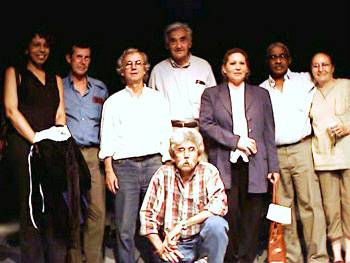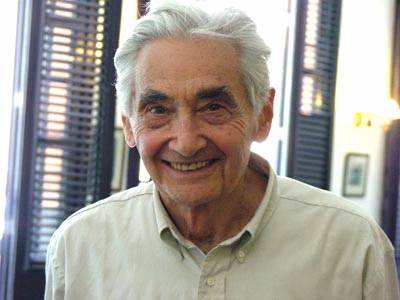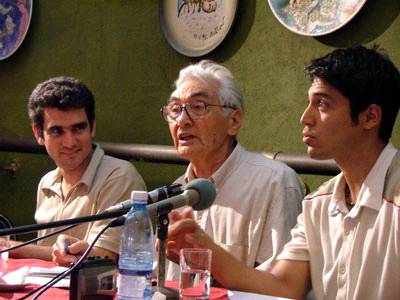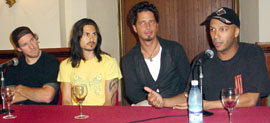
Two interviews with Howard Zinn. Translated by Ana Portela.
Editing, revision and web-preparation by Walter Lippmann.
==========================================

Two
interviews with Howard Zinn. Translated by Ana Portela.
Editing, revision and
web-preparation by Walter Lippmann.
==========================================
“MARX IS NOT DEAD”
And I am going to try to prove it by bringing him back on the scene. And from
there I'll show difference the U.S. public what Marxism is really about. Marx
himself would explain the difference between Stalinism and Marxism. I'll remind
people what Marx's criticism of capitalism was. I would demonstrate that these
ideas have much to with the United States today. In other words, that Marxist
criticism today is exact and current.
Exclusive interview with the U.S. writer Howard Zinn.
M.H. Lagarde | La Habana
Photos: Alain Gu

Reading the newspaper version of La
Jiribilla
"Thank God, an audience! I am happy you could come. You haven't listened to
those idiots who said Marx is dead! Well I am...and I'm not!" - Karl Marx
says in the very heart of Havana.
The audience to which this eternal party-pooper risen from the dead refers is
about a dozen people seated in the small Adolfo Llauradó Theater in the central part of the City, Vedado. While the actor
embodying Marx moves and talks on stage, the audience divides its attention from
the performance and the silhouette set off by a faint light of this tall and
gray-haired man who, from his chair, keeps jotting down notes in a notebook. It
is Howard Zinn, the U.S. writer and historian, who has come to see the
production of his monologue Marx in Soho by the Cuban actor and theater director
Michael Cué

The
who will represent
Invited by the National Council of Theater Arts and the Cuban Book Institute,
Zinn takes advantage of his second trip to the island to brush up on Cuban
reality. His first visit was during the 1970s with a group of Canadian tourists.
Among other places of interest, the 81-year-old writer visited the Fine Arts
Palace, the San Alejandro School of Painting and the National School of Ballet.
This interview was made in this latter institution, after visiting its
modern halls and installations in what were described by the author of the People's
History of the United States as "a dance palace filled with princesses and
princes. Here, the author of the Zinn Reader and You Can't
Be Neutral on a Moving Train, talks of his theatrical work that the Cubans
will now have the opportunity to enjoy this coming June, as well as some subjects
about the current situation in the United States.
One of your s
When I was 17, I began to read Marx and Engels. At 18 I
began to work in a shipyard. Together with three other radical young people, I
organized the Young Shipyard Workers Union. At that time, unions were very
exclusive and young persons could not join them. The four of us became a team
and met once a week. We read Marx and many years later, when I became a
professor, I gave a seminar on Marxism. I read a lot of literature on Marx and
became interested in his family life. For me to learn about him as a human being
is as important as learning of his ideas.
My first theater work was not about Karl Marx but about an anarchist and feminist, Emma Goldman. That play was shown in several cities of the US: New York and Boston, but also in London and Japan. Later, already interested in the theater, I decided to write a play about Marx. I made this decision after the fall of the Soviet Union because, after its fall, everyone thought that Marxism had died. So I tried to tell the US public: Marx is not dead and I am going to prove it by bringing him back to the scenario. From there I would teach this same public the difference between Stalinism and Marxism. I would remind them what Marxist criticism of capitalism consists of. I would demonstrate that these ideas have much to do about the US today. In other words, that Marxist criticism of capitalism is still exact and current today.
Since I didn't want to only represent ideas, I added information about the
relationship between Marx and his family, a little bit of humor, and a vision of
what a new society could be. That is why I have Marx speaking in the Paris
Commune of 1871. The Commune is a small light.

What has been the reception of Marx in Soho in the United States? Didn't
they confuse you with Groucho Marx?
The US people know more about
Groucho Marx than about Karl Marx. The play has been shown in forty venues in
the US, mostly for a university public. The number of spectators has fluctuated
from three hundred to a thousand and the play has always been well-received,
perhaps because it presents Marxist ideas clearly and simply. It is a question
of common sense. The play is a combination of humor and experiences, human and
family, and one can even laugh at Marx. It is what happens when Jenny laughs at
him and Eleanor does the same. I think this is more attractive for the public.
Marx doesn't come on stage as someone who knows it all.
Is
Some
Perhaps in one out

and writers in the
Hotel Ambos Mundos.
Can
I
In your work you
There are two parts of the press
in the US. One is television and the powerful newspapers that generally
support the position of the government, especially its positions on foreign
policy. For example, none of the important newspapers say that the US should
withdraw from Iraq. They say things should be done differently; they propose
getting the UN involved, a UN that they ignored from the very beginning. They
say that they need more soldiers and don't have more soldiers. "We should
have a better plan to occupy Iraq", but there is no form of basic
criticism. This is what happens in the powerful press. There is also the
opposition press that has a much smaller circulation. For example, The New York
Times reaches more than a million persons while The Nation reaches a hundred
thousand persons. The great television chains reach 30 million persons while the
smaller cable television only reaches several thousand persons. The same happens
with progressive radio stations may reach, perhaps, 50 thousand persons.
Af
The ignorance of the US public is
very hard to explain. They know there were lies but, perhaps, they are used to
these lies. They see on television and in the newspapers that there are things
that are not the truth, but don't follow it up with the conclusion that the
invasion of Iraq was wrong. Bush can say: "Well, we didn't find weapons of
mass destruction but we had to get rid of Saddam Hussein." They are
always changing the reason for the invasion, and if one of them is false, they
invent another. In a national survey about which television channels were most
watched by the population, it was revealed that the majority watch news on the
Fox chain. Of these, 80% say that weapons of mass destruction were found in
Iraq. In other words, the great mass media confuse their viewers. You will never
find real and direct criticism of the war in Iraq on these stations. It is
interesting to note that, in the United States, with these television and
large-circulation newspapers, the people are the least-informed in the
world.
In your play, Marx quotes the well-known words of Lincoln that says that you
fool some of the people but not all of the time. How long will we have to wait
for the people of the US to stop being manipulated?
This process has already begun. The number of persons supporting the war is
declining. When asked if the war was worth it, only 35% of the US public answers
"yes". This is different from what occurred six months ago or three
months ago. Every day there is a more striking difference between the editorials
and the news reports. While the editorials do not make fundamental criticism of
the war, the news articles report on the increasing number of casualties of the
US forces. These past weeks, as you know, reports have come out on the torture
of Iraqi prisoners. When the US people see this history time and again, it has
an eroding effect on their belief in the government. Yes, Lincoln was right, but
he didn't say how long it would take.
You have shown yourself as an optimist

Actualizado 4:30 P.M. (hora local)
ÓRGANO OFICIAL DEL COMITÉ CENTRAL DEL PARTIDO COMUNISTA DE CUBA
The
Human Reality of War Changed My Life
Confessions
made to Cubans, by one of the most prestigious American historians, playwright
and activist against imperialist wars.
PEDRO DE LA HOZ

“We had defeated German Nazism"
– he comments – "Italian Fascism and Japanese Militarism, but we soon
learned that fascism continues to exist. We
defeated Hitler’s racism but in other parts of the world and in my own
country, it existed. Later is the
fact that, from the air you don’t see or feel anything, the enemy is an
abstract idea. When I learned of the
human reality of war, my life changed.”
This 82-year-old man who moves with youthful energy across the United States,
calling for an end to the occupation of Iraq, shared these thoughts with an
incorruptible intellectual honesty. Three decades before he did the same during
the war in Vietnam and last year he signed the Call to the Conscience of the
World in defense of Cuba. His activism is an assurance of the great
prestige of his historical and academic work. His book, The People's
History of the United States (1980) has been sold for over 20 years in
almost forty editions and over 800,000 copies. He has also done high-ranking
analytical journalism in the alternative press.
His lightening quick 48 hour
presence in Cuba is in response to an invitation of the Cuban Book Institute and
the National Council of Theater Arts since the Cuban Social Sciences publishers
will soon issue one of his most renowned works and the actor, Michalis Cué will
perform his successful monologue, Marx
in Soho, now a classic of contemporary US theater.
Zinn lives intensely his
HISTORY OF A PEOPLE WHO HAVE
NO HISTORY
When
did you feel the need to rewrite the history of your country?
“When I had the certainty
that the official history, that in the texts books, inculcated in us a mythical
dimension of our nation. And that
lies had been added upon more lies on certain events.
I want to tell it from the point of view of the victims, the soldiers
sent to war, the workers who were exploited for the purpose of swelling an
enormous wealth. Do you want a
greater lie than insisting that, by the end of the 19th century, the
How has your
book been received? Have you been accused of not being objective?
“Let’s
answer the first part. The book has had a
better circulation than I expected. But
if you look at things carefully, you get an idea at how capitalism works.
The publishing house is part of the Rupert Murdoch conglomerate, a brutal
example of the right. But when
people began to find out that the book offered a different view of history, the
editorial house did not hesitate to promote more sales.
Profits are profits and that is the first law of the system.
As to the objectivity of history, I think that, in this matter, it is not
also desirable. Those who call
themselves objective lie because they pick events and cover up their taking of
sides. I do not hide to say: this is
my point of view, it is not the only one, face it and make your own conclusions.
THE
How do you
think the people of the
I think that increasingly more
people are tired of this war and understand that it is an operation of
occupation and not a liberation, as proclaimed by the official propaganda.
The dead beginning to arrive are a heavy burden and the effect of a
resistance grows and has converted the occupation into an impasse.
Unfortunately, many of those who oppose the war do not do so for ethical
reasons; rather secondarily.
Will you talk of what you
have seen in
It is very necessary.
If the average person of the
TRANSLATED BY ANA PORTELA
http://www.granma.cubaweb.cu/2004/05/07/cultura/articulo02.html